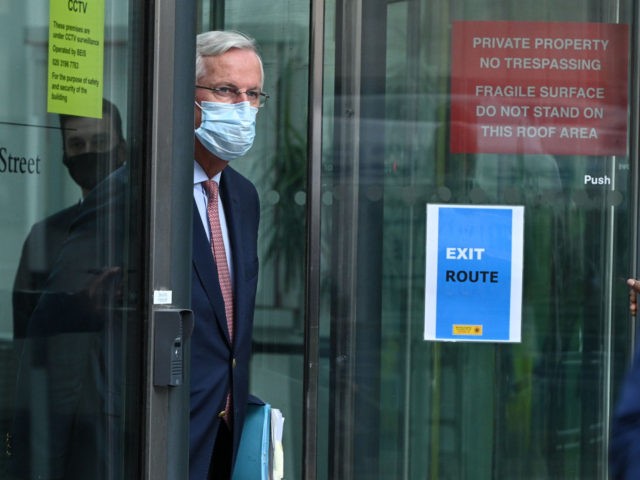The European Union’s top Brexit negotiator has rejected Boris Johnson’s Brexit deadline, set to expire this week, remarking of the seemingly endless rounds of deal talks “we still have time”.
The comments from Michel Barnier, the EU’s chief Brexit negotiator, come two days before a crunch deadline which PM Boris Johnson previously said would be the cut-off point for reaching an agreement.
The 15th of October was a key date, the prime minister said, because it is the day of a European leaders’ summit, and if talks went any longer than that there would be no time for any potential deal to actually be agreed and ratified by European member states.
As Breitbart London reported, Johnson said of it, if there was not an agreement by this week: “I do not see that there will be a free trade agreement between us, and we should both accept that and move on… So there is no sense in thinking about timelines that go beyond that point.”
Indeed, any hope for a deal this week seems extremely low. While both sides of negotiations by turns make encouraging noises in the press about inching towards a deal or looking for a “landing zone” in talks, they also temper these by accusing each other of refusing to budge from negotiating points and red lines. In reality, it appears that London and Brussels want so radically different outcomes from the Brexit negotiations, reaching a deal may be very difficult indeed.
Nevertheless, failing to reach an agreement this week should not be a cause for concern, Barnier said. London newspaper The Guardian reports his comments mocking the prime minister’s deadline, noting that others imposed by the British government had come and gone in recent years, quietly swept under the carpet when it became evident they would not be met.
He is reported to have said a deal would be “very difficult but still possible”, but: “It is the third unilateral deadline that Johnson has imposed without agreement… We still have time.”
Perhaps most telling, though, was Barnier’s reported comments on what was holding back progress, when he is reported to have said “movement on three key issues was still necessary”. In other words, it was down to the British to cave to European demands in order to let talks progress.
These attitudes pervade across European capitals. On Tuesday morning, Germany’s Europe minister said the United Kingdom would have to compromise on key issues like never regaining control of its own territorial waters, and allowing the European Union to set rules and regulations inside the United Kingdom, in order to sign a deal.
Making his demand, Michael Roth said Germany and other EU states “expect substantial progress by our friends in the United Kingdom in key areas: in particular on governance, ‘level playing field’ and fisheries.”
The European Union has dominated Britain’s fishing waters for decades, with European boats landing more than 60 per cent of the fish catch. Brexit leader Nigel Farage has called regaining control of these areas the ‘acid test’ of Brexit.
The United Kingdom officially left the European Union at the start of this year, but as part of a package of measures slowing the country’s departure — Britain voted to leave way back in 2016 — the nation remains an informal member of the bloc until the end of 2020 at the earliest. The present round of talks are trying to determine what Britain’s relationship with the EU will look like at the end of this year, after the transition period is over.
For the European Union itself and its ‘remainer’ devotees in Britain, that future relationship should be as similar to the status quo as possible. For Brexiteers, voting to leave means Britain regaining control over its own laws and borders, a major shakeup of the European order. Boris Johnson for his part has “categorically” promised that Britain will be leaving the EU at the end of this year, and that “we will take back full control of our money, our borders and our laws.”

COMMENTS
Please let us know if you're having issues with commenting.